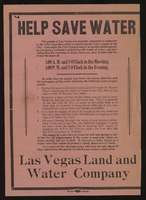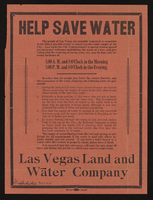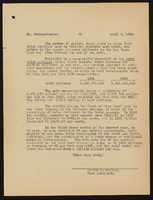Search the Special Collections and Archives Portal
Search Results
George Petri Collection
Identifier
Abstract
The George Petri Collection (approximately 1977-2010) contains food and beverage management manuals and employee instructional documentation from various resorts in Las Vegas, Nevada including Empress Casino, Harrah's Entertainment, Luxor, and Station Casinos. The materials were collected by George Petri, who was a Maître d'hôtel at the Regency Room restaurant at the Sands Hotel and Casino and also worked at other resorts in Las Vegas. Materials also include artifacts such as silver plated dinnerware from the Regency Room and various menus and memorabilia from the Sands Hotel over the years.
Archival Collection

Transcript of interview with Charles Nur Fernald by Claytee D. White, May 31, 2014
Date
Archival Collection
Description
Text
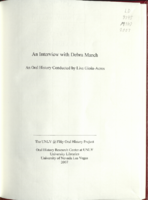
Transcript of interview with Debra March by Lisa Gioia-Acres, February 21, 2007
Date
Archival Collection
Description
Text

Transcript of interview with Dorothy Pitzer by Judy Harrell, May 19, 2014
Date
Archival Collection
Description
Born in Chicago and raised in small Illinois towns, Dorothy Karper met her future husband, Doug Pitzer, when they went to rival high schools. She began nurses’ training in Dixon, Illinois, and immediately after her 1950 graduation, Dorothy and Doug married. Although he never had to go overseas, the Korean War interrupted their married life, and Doug enlisted in the Air Force and went to basic training in Texas. The couple arrived in Las Vegas in July 1954, when Doug was transferred to Nellis Air Force Base. Dorothy worked as a nurse at Las Vegas Hospital and Clinic 1954-1957 and later worked for a private obstetrics practice. From 1954 until Doug’s discharge in 1957 the Pitzers lived in Kelso-Turner Terrace military housing. In 1956 they purchased a new house in Twin Lakes, but they didn't move in until 1957, after the streets were put in. They remained in their Twin Lakes house until they moved into Dorothy’s present house on Burton Avenue, between West Charleston Boulevard
Text

Mike Meade interview, February 28, 1977: transcript
Date
Archival Collection
Description
On February 28, 1977, collector Steve Gortz interviewed Mike Meade (b. September 16, 1950 in San Francisco, California) about his life in Nevada. Meade speaks about growing up in Tonopah, Nevada before its decline in population, his move to Elko, Nevada and eventually to the city of Las Vegas. Moreover, he talks about the development of the Strip, the differences between Las Vegas and rural Nevada, as well as the changing environmental landscape. Meade also spends time discussing the controversy surrounding the University of Nevada, Las Vegas (UNLV) dormitory at the time of this interview, the attitude of locals, and his opinion on brothels and prostitution. Lastly, Meade talks about the city’s pollution, the sports and recreation throughout the whole of the state and ends by reading a poem about Nevada from a Bicentennial book.
Text

Transcript of interview with John L. Houck by Perry L. Smith, March 14, 1981
Date
Archival Collection
Description
On March 14, 1981, collector Perry L. Smith interviewed police officer, John L. Houck, (born May 11th, 1944 in Butte, Montana) in his home in Las Vegas, Nevada. This interview offers an overview of the history of Las Vegas and insider details on early Las Vegas police work. The interview concludes with a discussion on Henderson and Boulder City.
Text
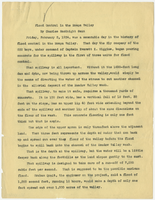
Report, Flood control in the Moapa Valley, circa 1934
Date
Archival Collection
Description
Narrative describing the construction of a spillway in the Meadow Valley Wash by the Civilian Conservation Corps.
Text

